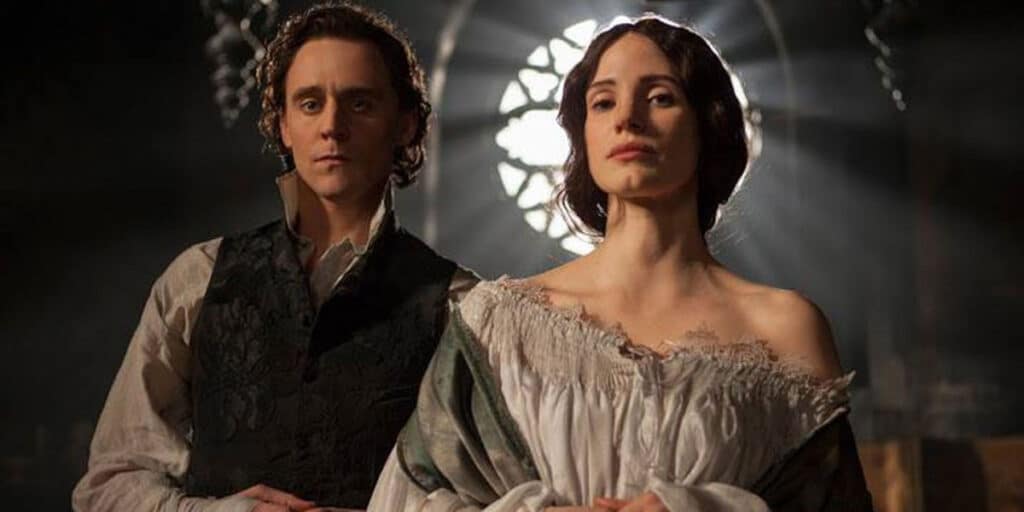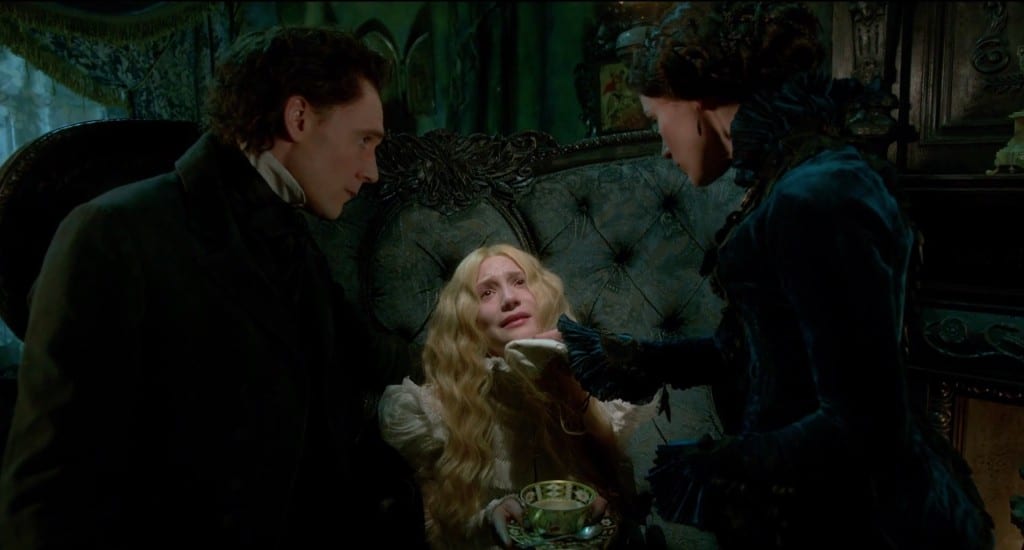Read also:
How to Watch FX Live Without CableHow To Watch AMC Without CableHow to Watch ABC Without CableHow to Watch Paramount Network Without CableGuillermo del Toro’s criminally overlooked ode to Daphne du Maurier turns five, and it’s as potent as ever.
There are few directors who toy with the conventions as Guillermo del Toro does, and there’s no question that he puts his own unique stamp on several genres he clearly adores in the 2015 film Crimson Peak. Gothic romance, horror story, twisted fairy tale, and bodice-ripper – the film has it all. Del Toro’s vision comes through in every frame, much like the eponymous location, which oozes red and looms above all else, including the characters.
We learn the name of the rotting estate far before we learn the name of our heroine Edith Cushing (Mia Wasikowska), the demurely optimistic, aspiring writer who is the child of a self-made business tycoon (Jim Beaver) in early 20th century America. She may take after her father in her disdain for those who inherited their wealth – ironic being that she’s an heiress herself – but she’s nevertheless swept off her feet in a passionate whirlwind romance when the English baronet Tom Hiddleston… errr… Thomas Sharpe comes to town, the very man her (dead) mother warned her about.
Hardly surprising it didn’t take, given Hiddleston’s charms, and the fact that the film takes pains to state that Edith could be the belle of many a ball… if she didn’t scorn the frivolities all the other female characters take so seriously, often belittling Edith for her bookish interests. Sometimes it’s easy to forget how often female characters lacked friends of the same gender until about 2016.

When Edith and Thomas marry and she’s taken to her to new husband’s ancestral estate, the titular Crimson Peak, that’s when del Toro is in glorious peak form. It’s also when the film’s flaws really rise up, much like the specters who immediately make themselves known to Edith and guide her in deciphering the various secrets Thomas and his sister Lucille (Jessica Chastain) are hiding.
And they’re clearly hiding something. Crimson Peak may have plenty of modern touches and make full use of all the effects thereof, but there’s not a sneer or a smirk to be found. The film wears its bloody heart on its sleeve, unafraid of its own sincerity as the plot unfolds, with plenty of revelations, but few surprises. There’s no doubt that “ghosts are real,” as Edith states in the beginning, and anyone expecting shocking, upending plots twists will be quite disappointed.
There’s also little doubt as to who the real villain is, and why many reviewers cited Rebecca and Jane Eyre (one version of which also starred Wasikowska) as clear influences. Both feature young, strong, yet naive heroines who must contend with older, worldly, deeply sexual women as obstacles to the happiness awaiting them, and Edith is certainly in that heroic mold. With her bright blonde hair, yellow dresses, the way her hands tremble as she wanders fearfully alone through her creepily oppressive home holding aloft a lit candelabra, she is the innocent virgin, the victim we always sympathize with. How could we help ourselves?
Crimson Peak may have plenty of modern touches and make full use of all the effects thereof, but there’s not a sneer or a smirk to be found.
Since this is a film with few surprises and no subtlety, it’s hardly shocking that her main oppressor Lucille Sharpe isn’t just Edith’s opposite, but everything society tells women not to be: deeply sexual, filled with rage, and perhaps most crucially, older, unmarried, and sans children. From the moment we meet her, black-haired and wrapped in a red dress as she plays a darkly beautiful tune on the piano with icy precision, she embodies the Sharpe home and its unsavory history.
Thomas may be a fully aware, willing participant in their crimes, but Lucille is the one who gets her hands dirty and disposes of their many victims, with Chastain throwing herself into the role and quickly becoming the standout as Lucille and Edith play their deadly game, each trying to survive the other.
Make no mistake, it’s not just Edith battling for survival as the siblings slowly poison her on their isolated estate, which seems to ooze blood as it slowly sinks into the red clay beneath. What Crimson Peak fails to recognize, even as it provides plenty of motives for Lucille’s actions and occasionally grants her moments of vulnerability, is that Lucille’s life is at stake too, and not just for her crimes, which have been many and grisly.
For all her privilege, she is a woman with few resources and opportunities, who endured a childhood of physical and emotional abuse. Conversations reveal how much physical violence was a fixture in the life of her and her brother, with their mother regularly beating them both with a cane, and whose father beat her so severely he broke her leg and left her bedridden for a time.
And yet Lucille is the one society expects to nurse her abuser back to health (and did). She also receives the majority of the blame not just for the crimes she and her brother commit, but for their incestuous relationship. Thomas has the face of a tortured angel as he becomes more and more conflicted, even partly redeemed when he eventually attempts to save Edith from his sister. Hiddleston is more than up to the challenge, and it’s hard to picture other actors so convincingly pulling this off and earning our sympathy.
That Edith does survive (women like her always make it to the end) is mostly thanks to her childhood friend Alan (Charlie Hunnam), who harbors an unrequited love for her and investigates. Edith may have deduced what was happening, but she’s no match for Lucille, who not only outwits her at every turn but is fully aware of how toxic the love she and Thomas have for each other is.
The truth is that Lucille is the character who most closely resembles a victim of abuse. Lucille is constantly in survival mode, believes that love is finite in a fundamentally harsh and unjust world, and most tragically, continues the cycle of violence by inflicting it upon others, whether it’s her own mother, or the women Thomas marries for their money and she disposes of, and whose situations bear an unsettling resemblance to her own. All of them were wealthy women with no living relatives to look for them, with their dreams of a better life long since abandoned.
Similarly, Lucille’s solace both during and after her abuse is Thomas, the only one who shared her pain. The night he and Edith spend away from Crimson Peak and consummate their marriage is when Lucille has a small breakdown as she realizes she’s losing the only person she was ever able to love, as well as her sole source of economic support.

Pick up any Jane Austen novel and you’ll find entire plots set in motion by young brides who were less than sympathetic to their husbands’ spinster relations. And Chastain isn’t just more interesting than any blushing bride, it’s compulsively fascinating to watch her smile and be a villain in the mold of the best Shakespeare antagonists. So larger than life is she that even the decaying mansion which creaks and groans at every turn as if mourning the various sins it houses can swallow her up. No wonder the ghosts aren’t that frightening — they’re merely the direct results of the evil deeds the living commit, many of whom are just as frozen in time as the deceased who haunt their halls.
Not that Edith doesn’t deserve our sympathy, but how could she really compare? Del Toro knows it, and he’s fully aware of who should have the last word, if not the last lines. Lucille may not find peace even in death, but it’s nevertheless her fate to remain a formidable presence in the place where her greatest pain and her greatest joys are gruesomely intertwined, determined to remain in the past in a world that left her behind long ago.